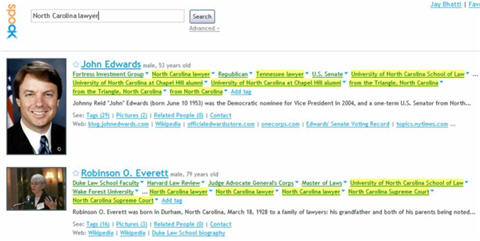Spock's alpha people network

One of the debutantes at the Web 2.0 Expo this week is Spock. While the name was acquired from the now defunct Dr. Spock Web effort, this Spock is about finding people, not health and babies...or Star Trek. Mike Arrington (Techcrunch), Rafe Needleman (Webware) and Tim O'Reilly have covered it already in fine detail. They are all mostly enthusiastic about the effort, which is still in alpha and will go into private beta next week.
I got a preview of Spock and liked the concept. The software is still under construction, and while it can do some nice tricks, it also demonstrates the difficulty in building a specialty search engine. In addition, I see Spock as more of community site, which starts with people profiles but extends deeply into the social networking sphere, similar to LinkedIn or Facebook but with data gleaned from the entire Web and user inputs.
Spock has crawled about 200 sites, such as LinkedIn, Facebook, Wikipedia and IMDB--the low hanging fruit--and is also incorporating the larger Web. At this point, Spock has accumulated 2 billion data elements and records on about 100 million people, said CEO and co-founder Jaideep Singh.
Spock aggregates and tries to disambiguate the data strewn across the Web related to individuals. It's clear that disambiguation and delivering good people finding results is not an easy problem for machines to solve. The term "North Carolina lawyer " is fairly easy to parse (especially if there are clean sources to crawl and plenty of good metadata), compared to "John Smith" or even "George W. Bush," which confused the alpha Spock--the "W" caused it to throw up a poor result.

Spock adds associated tags, such as other attributes linked to the entity North Carolina lawyer John Edwards, and can also include metadata, such as age and gender, gathered from various sources. The human input comes in the form of adding new tags and voting (yes or no) on the validity of existing data, such as photos, Web sources and tags. Spock has filed for some patents around the combination of tag extraction and the ability to take machine and human input to create rankings, Singh said.
Social networking comes into play in the way that people can have "favorites" and claim their own profile. Favorites is a collection of people you care about in the Spock network. For example, you can find golfers among friends who are VCs (given the data is present), said Jay Bhatti, Spock co-founder and product manager. People will be able to "claim" their profile and control aspects of their Spock persona.
While Singh and Bhatti claim that they don't intend to turn Spock into a social network, it seems a logical byproduct of the feature set. People will have multiple places online where their personae exist; Spock taps into the superset of the data to render its profiles, and is its own network, surfacing relationships between people and groups. Spock will enable users to import contact lists, such as from Outlook or LinkedIn, and add them to the network. Sounds like a social network to me.